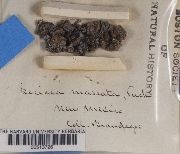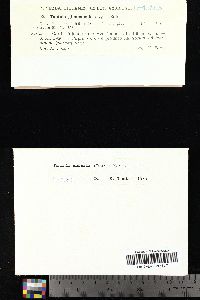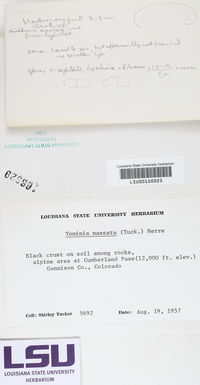
Consortium of Lichen Herbaria
- building a Global Consortium of Bryophytes and Lichens as keystones of cryptobiotic communities -
- Home
- Search
- Images
- Species Checklists
- US States: O-Z >
- US National Parks
- Central America
- South America
- US National Parks
- Southern Subpolar Region
|
Thalloidima massatum (Tuck.) Kistenich, Timdal, Bendiksby & S.Ekman
 (redirected from: Toninia massata (Tuck.) Herre) (redirected from: Toninia massata (Tuck.) Herre) |
|
|
Family: Ramalinaceae
[Lecidea massata Tuck., moreToninia massata (Tuck.) Herre] |
Nash, T.H., Ryan, B.D., Gries, C., Bungartz, F., (eds.) 2002. Lichen Flora of the Greater Sonoran Desert Region. Vol 1. Life habit: lichenized, lichenicolous or not Thallus: squamulose squamules: up to 2 mm diam., scattered to adjacent or rarely indistinctly imbricate, rounded or irregularly lobed, weakly convex to bullate upper surface: olivaceous or grayish green to brown, epruinose or partly covered by farinose pruina, usually shiny, often with regular, shallow fissures, lacking pores and pseudocyphellae upper cortex: up to 80 µm high, lacking calcium oxalate margin: concolorous with upper surface Apothecia: up to 1.5 (-2) mm diam., plane and marginate when young, later convex and immarginate, epruinose; exciple: dark gray in the rim, pale brown to medium brown in inner part; hypothecium: pale or reddish brown to colorless; epithecium: gray (K+ violet, N+ violet) asci: clavate, 8-spored ascospores: fusiform, 1-septate, 10-16.5 x 3.5-4.5 µm Pycnidia: not seen Spot tests: all negative Secondary metabolites: none or undetermined terpenoids (chemotype D). Host: cyanolichens Substrate and ecology: on soil in open habitats and in pinyon-juniper woodlands, up to 1530 m World distribution: Mediterranean Europe, Macaronesia, Russia, western North America Sonoran distribution: rare in Arizona and Baja California. Notes: This rarely collected species resembles T. sedifolia, but differs in having more flattened squamules which never have a white margin, a more shiny and finely fissured upper cortex, shorter spores, and in usually containing terpenoids (chemotype D). |
Powered by Symbiota

















